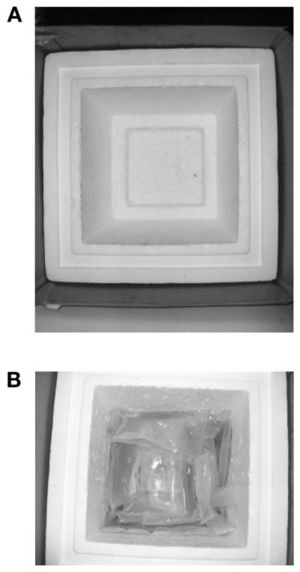
Problem being addressed[edit | edit source]
Electric incubators are normally used to hold blood samples at 98.6 degrees Fahrenheit (the temperature of the human body) for 24 hours, in order to check for the growth of harmful bacteria. Portable, battery-powered models are available, but cost $1,500 to $2,500, and tend to be fragile.
Detailed description of the solution[edit | edit source]
The incubator holds plastic balls filled with chemicals that have a melting point of about 99 degrees Fahrenheit. To fire up the incubator, people just have to leave the balls out in the sun, or heat them in hot water, until the chemical inside melts. The balls, which will remain at the heated temperature for a full day, are returned to the insulated cooler along with water tests in petri dishes.
Designed by[edit | edit source]
- Designed by: Amy Smith of Massachusetts Institute of Technology
- Location: This device was developed in Cambridge, Massachusetts, USA
When and where it was tested/implemented[edit | edit source]
The PortaTherm was tested in Peru, Honduras, Haiti, and Pakistan from 2000 to present.
Funding Source[edit | edit source]
In 1999, this project was given $20,000 from the Massachusetts Institute of Technology, BF Goodrich Collegiate Inventors Award.
References[edit | edit source]
Peer-reviewed publication[edit | edit source]
Dominguez M., Smith, A., Luna, G., Brady. M.F., Austin-Breneman, J., Lopez, S, Yataco, R, & Moore, D.A.J. 2010. The MIT D-lab electricity-free PortaTherm™ incubator for remote testing with the QuantiFERON®-TB Gold In-Tube assay. International Journal of Tuberculosis and Lung Disease,14(11), 1468-1474. Link available here.
Externally generated reports[edit | edit source]
Brehm, D. (24 Nov 1999) Student's low-cost solution aids high-tech problem in Africa. MIT News. Link available here.
Carr, C.E., Berris, M.J., Hilstad, M.O., & Allen, P.B. (n.d.) Water quality and fecal contamination on Mt. Aconcagua: implications for human health at high altitudes. PDF available here.
Holland, R. (28 Feb 2000) Technology as a form of altruism. Boston Business News. Link available here.
McKeogh, T. & Lee, J. (1 Oct 2007). Low-tech laboratory. Good. Link available here.
Ward, L. (1 Oct 2009). Three small, low-tech inventions for big, world-changing problems. Popular Mechanics. Link available here.